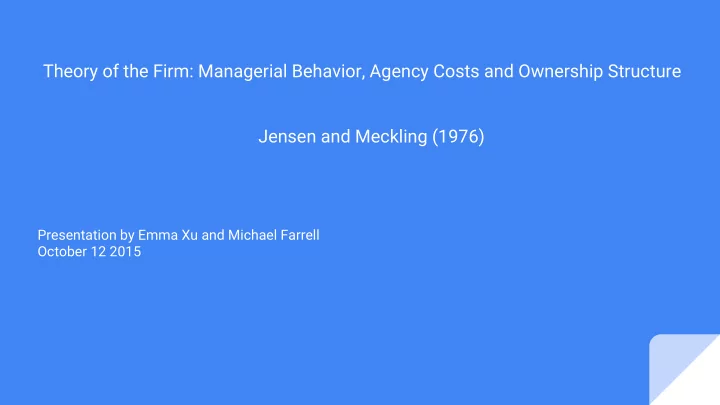

Theory of the Firm: Managerial Behavior, Agency Costs and Ownership Structure Jensen and Meckling (1976) Presentation by Emma Xu and Michael Farrell October 12 2015
Overview One of the most cited papers in Finance Develops Agency Theory Provides theory on why commonly held firms do not maximize value per se Explains why debt is a source of capital even without tax advantages Explains why lenders place restrictions on debt Explains why issuers of stock/debt accept restrictions and monitoring
Agency Costs Agency Relationship Costs paid by the initial entrepreneur. Agency costs: Monitoring Expenditures + Bonding Expenditures + Residual Loss Corporation a specific case of the agency problem
J&M General Comments on the Firm Legal Fiction Nexus of contracts: makes little sense to think of insiders and outsiders The firm is not an individual Every individual is maximizing their own personal utility “The behavior of the firms is like the behavior of a market.” p.311
Agency Costs of Outside Equity Compare behavior of manager who owns 100% vs manager who owns (1-a)*100% Relative cost of pecuniary ($$) and nonpecuniary :-D costs changes Lowers firm value They also show that this lowers investment
Monitoring Change incentives Cost of monitoring: M
AC Equity Tension between managers and outside shareholders Monitoring/restraining manager from deviating from shareholder maximum Costly Benefits and Costs: sounds like we will have an equilibrium.
Agency Cost of Debt Debt: fixed payments, possibility of default in cases of bankruptcy. What incentives does borrowing introduce? Excessive risk-taking. Insulates manager from the full impact of decisions -- limits losses in bad states of the world.
An Extreme Example: Risk shifting Assume a firm has $10m debt due tomorrow The total assets of the firm is worth $8m now The firm can take the $8m to Las Vegas and play “double or nothing” If doing nothing: $8 goes to debtholders, equity value=0 If playing gamble: winning-$10m to debtholders, equity value=$6m losing-both debtholders and equityholders get nothing
Restrictions and Monitoring Providers of capital are not stupid (or at least should not be!) They will anticipate these types of incentives Solution: structure loan contracts accordingly (in terms of price and covenants) At the cost of equity holders
Equilibrium Ownership Structure A theory on capital and ownership structure: There is an optimal debt-equity mix that minimizes total agency costs. So: Value of “outside” equity B: Debt A(E): Agency costs
Thank you!
Recommend
More recommend